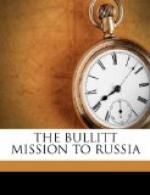This is a matter, it seems to me, of some importance in regard to the whole discussion, and therefore I feel at liberty to read it, as it is not a personal matter.
The CHAIRMAN. This is a note of the conversation made at the time?
Mr. BULLITT. This is a note which I immediately dictated after the conversation. [Reading:]
Mr. Lansing then said that he, too, considered many parts of the treaty thoroughly bad, particularly those dealing with Shantung and the league of nations. He said: “I consider that the league of nations at present is entirely useless. The great powers have simply gone ahead and arranged the world to suit themselves. England and France in particular have gotten out of the treaty everything that they wanted, and the league of nations can do nothing to alter any of the unjust clauses of the treaty except by unanimous consent of the members of the league, and the great powers will never give their consent to changes in the interests of weaker peoples.”
We then talked about the possibility of ratification by the Senate. Mr. Lansing said: “I believe that if the Senate could only understand what this treaty means, and if the American people could really understand, it would unquestionably be defeated, but I wonder if they will ever understand what it lets them in for.” He expressed the opinion that Mr. Knox would probably really understand the treaty— [Laughter.] May I reread it?
He expressed the opinion that Mr. Knox would probably really understand the treaty, and that Mr. Lodge would; but that Mr. Lodge’s position would become purely political, and therefore ineffective.
[Laughter.]
The CHAIRMAN. I do not mind.
Mr. BULLITT (reading):
He thought, however, that Mr. Knox might instruct America in the real meaning of it.
[Laughter.]
The CHAIRMAN. He has made some very valuable efforts in the direction.
Mr. BULLITT. I beg to be excused from reading
any
more of these conversations.
Senator BRANDEGEE. We get the drift.
[Laughter.]
I want to ask one or two questions.
The CHAIRMAN. Go ahead.
Senator BRANDEGEE. Did you read any of these minutes of the meetings of the American commission?
Mr. BULLITT. Of the American commission itself?
Senator BRANDEGEE. Yes.
Mr. BULLITT. No, sir. I have on one or two occasions glanced at them but I never have read them carefully.
Senator BRANDEGEE. They were accessible to you at the time, were they?
Mr. BULLITT. They were, sir.
Senator BRANDEGEE. You stated, if I recall your testimony correctly, that when the proposition was made that the legislative bodies of the contracting parties should have representation in the assembly, the President objected to that?
Mr. BULLITT. The President—if I may explain again—approved in principle, but said that he did not see how the thing could be worked out, and he felt that the assembly of delegates, or whatever it is called in the present draft, gave sufficient representation to the peoples of the various countries.




